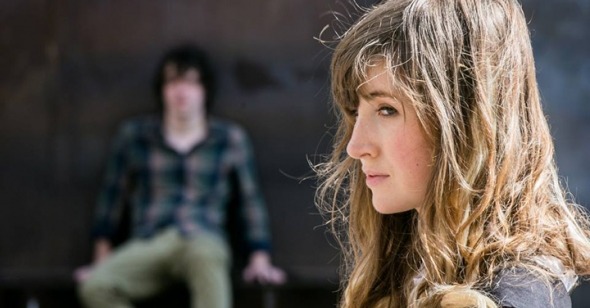Body Building
By Michael Koresky
The Heart Machine
Dir. Zachary Wigon, U.S., Filmbuff
The first shot of Zachary Wigon’s The Heart Machine is of blurred forms moving in slow motion in some sort of dimly lit club atmosphere. At first they are only discernible as streaks of phosphorescent reds and blues, but slowly the shapes in this room—an atypical setting for the film, as it turns out—become legible as bodies. Sitting in the center of this image of strangers trying to connect is Cody (John Gallagher Jr.), a twentysomething New Yorker who looks downcast amidst this flurry of desperate motion. It’s a strikingly expressionist opening for Wigon’s otherwise visually down-to-earth debut feature, but an apt one, as the film is concerned with physical bodies slowly coming into view, to each other and to us as audience members.
Thinking of The Heart Machine as a film about the split between the physical and the emotional, and the romantic difficulties that emerge from that, is more helpful than typifying it as another “relationship drama for the digital-age.” Tasked with most embodying this schism is Kate Lyn Sheil as Virginia, Cody’s girlfriend, whom he has never met in person. They carry on a strictly Skype relationship, as they first connected online and he lives in Manhattan’s East Village while she is currently abroad in Germany. However, not long after the film begins, their already precarious union becomes even more fraught when Cody sees a Barthes-reading Virginia doppelganger on the subway, her resemblance too striking to dismiss. This plus the alarmingly New York–sounding siren he hears coming through the windows in her apartment while they chat leads him to believe that she is right there, in his own backyard, rather than four thousand miles away. The possibility gnaws at him, turning his perceptions of their relationship upside-down, and thrusts him into the initially reluctant position of sleuth, trying to track her down on the streets of his Manhattan urban jungle rather than just coming out and asking her if she’s been lying.
Despite this setup, The Heart Machine is not structured like a mystery: it’s to Wigon’s great credit that early on in the film he reveals the truth regarding Virginia’s whereabouts. This disallows the film from being the umpteenth tale of the “unknowable woman,” which could have easily been the case, considering Sheil’s appealingly opaque acting style and the fact that Virginia is only known to Cody as a mess of pixels on his MacBook. Instead the film is told from both characters’ points of view, tracing their paralleling emotional confusions: his tireless inquiring into her whereabouts, her more internal reckoning with the self. Wigon’s film is intelligently structured so that the more we get to see each of them in their separate worlds the more we suspect that the differences in their approaches to love and sex might make them ultimately incompatible: he’s a romantic and firmly goal-oriented, she’s disconcertingly spontaneous and unsure of what she wants.
Whereas Cody is the type who would have to talk himself into casual sex, Virginia cannot seemingly stop herself from engaging in it, or at least in testing her own boundaries, as when, behind her ostensible long-distance boyfriend’s back (yet perhaps right under his nose) she goes on dates with men met on “Blender,” a Tinder-esque hetero hookup phone app. Wigon and cinematographer Rob Leitzell shoot her first (so she claims) date in an effectively cagey way, keeping the camera only on Sheil, so that for a while we cannot see the stranger on the other side of the table at the Village bar where she meets him. It’s a visual approach that pops up again when Cody interacts with an unseen bartender right outside the frame, another gentle visual cue that there is isolation even in connection.
That said, Wigon’s film seems mercifully disinterested in making any sort of “we are all disconnected” statement (which has become as irritatingly omnipresent as the spate of “we are all connected” films from almost a decade ago). The Heart Machine is unerringly free of judgment for its characters, which is noteworthy considering that they both could be regarded as either foolish or hopelessly lost. Cody, who grows increasingly creepy the more obsessed he becomes with finding out the truth about Virginia (talking his way into the apartment of a local coffee-shop barista and later taking a girl out on a date because he suspects they may have information on her), is only as desperate for love as any of us. Virginia, meanwhile, is not depicted as using sex to ease some profound emotional damage—as our many sex-negative dramas and comedies tend to do—but rather because accessible erotic connection is now the name of the game, especially in a buzzing hive like New York City. Cody, a driven dreamer, and Virginia, a cool pragmatist, are products of their environment, but this doesn’t make them inhuman or programmed. By the end, they are as much or as little as any of us: flesh and blood.
